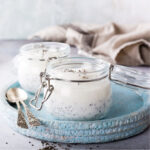Delicious homemade lime curd made using the traditional cooking method with fresh limes, butter and egg yolks. Perfect on toast, as a tart or cake fillings or drizzles over your favourite pudding.
It makes a nice change to the traditional lemon curd and since you can’t readily buy it in the regular shop, it makes it pretty special too.
Why make this recipe?
- Suprisingly easy to make (and quicker to make than a lime marmalade recipe)
- Very zingy taste
- Great as a gift for your family and friends

MORE CURD & SPREAD RECIPES
What exactly is lime curd
Lime curd a sort of sweet condiment or preserve. My lime curd recipe is a variation on a lemon curd, which you can normally buy in most supermarkets. Lime curd preserve is not made with milk, cheese or curd, but it’s made with fresh fruit, sugar, butter and eggs.
How to use lime curd
Lime curd can be used in the same way as marmalades or jams for toast, croissants or bread rolls in the morning.
You can also use lime curd as a filling for various fruit tarts and for baking.
One of my favourite ways of using lime or lemon curd is to make a zingy chocolate truffle ganache.
I usually use white chocolate and instead of cream I use lime or lemon curd to make the ganache. The flavour is amazing especially if you add a few extra drops of real lime juice, a tiny pinch of salt and a tiny pinch of ground white pepper.
Lime curd is also perfect as a fruit layer for various no-bake puddings or cheesecakes. It’s also perfect as a topping for breakfast porridge, oatmeal or pancakes.
Lime curd is also perfect as a filling for muffins and can be also used to drizzle over cakes and perfect to make frosting for lemon cakes.
My top tips on making lime curd recipe successfully first time round
Don’t rush the stirring and thickening of the lime curd. It will happen eventually, but you don’t want to end up with scrambled eggs.
Use caster sugar for a smooth texture
The question of using whole eggs versus egg yolks in fruit curds
Over the years, I’ve made quite a few batches of different fruit curds with whole eggs and with egg yolks only and there are benefits of both methods.
Whole eggs lime curd method
- No wastage – use whole eggs for the recipe
- Could taste a bit ‘eggy’ and rubbery (because of the egg white)
- Easy to get scrambled when you overheat the mixture
- Some people are alergic to egg whites
Egg yolks lime curd method
- More creamy & smooth texture, flavour and finish
- Less prone to curdling when heated up
If you see any recipe with whole eggs and you want to replace them with just egg yolks, you should double the amount of eggs. Leftover egg whites are perfect for making simple omelettes, traditional yeasted pancakes or making meringues.
What makes this recipe work
The combination of zingy limes works great with the smooth buttery flavour of the curd.
Any specialist equipment needed?
- Medium size saucepan
- bowl (glass or stainless steel) to fit inside/above your saucepan
- 2 medium sized jam jars
How to make sure your lime curd doesn’t curdle
Make sure that you heat the lime curd mixture over very low heat and that your mixing bowl doesn’t touch the water. Keep checking the level of water too to ensure that you have enough under your bowl.
Stir your lime curd mixture steadily, but don’t go crazy with it. If you stir it too much over a very hot heat, you’ll end up with scrambled eggs!
If you want to get even smoother and thicker lime curd use 4 egg yolks instead of the 2 eggs. This will help to emulsify the mixture more, makes a smoother texture and also help with making the flavour richer.

Ingredients & Possible Substitutions
Limes
Make sure you use organic and not treated limes, because we will be using the fruit’s rind. If you are short of lime zest you can also use other citrus zest from my orange zest substitution list.
Butter
Unsalted butter is best for this recipe, but you can use a part salted and part unsalted butter as well. Make sure that if you use salted butter you don’t add more salt to the recipe.
For the traditional lime curd recipe, I use regular dairy butter.
Sugar
Caster sugar is best for this recipe because it dissolves quicker (the sugar crystals are small). You can also use granulated white sugar.
I wouldn’t recommend using any brown or dark sugars, coconut sugar or it’s alternatives as it would change the flavour of the lime curd too much and the sugar would also spoil the colour.
Saying that you can actually use honey or agave syrup with this recipe. Just swap the same amount of honey or agave syrup for the caster sugar. You will achieve a slightly mellow, sweeter taste and the honey or agave syrup will come through really nicely.
Again, I wouldn’t use any darker natural sugar syrups (like date, maple or carob syrups) because the flavour and colour would suffer.
If you want to know more about what type of sugar to use, you can refer to my Marmalade Making Tips Guide which covers this topic really well.
Eggs
The fresher eggs you use the better because they will emulsify (cream in) better. It’s your call if you use whole eggs or egg yolks, there are some advantages and disadvantages to both methods (see my notes above).
I usually use medium to large size eggs, but over the years I probably used mixed sizes too. It’s just a matter of simmering the curd for bit longer if you need to towards the end of the cooking process if the mixture is too liquidy.
Salt
Salt is totally optional, but I think it helps to balance out the flavours and makes the zingy lime flavour pop even more.
The method – How to make lime curd
Wash the limes and dry them first.
Grate the rind to get as much lime grind as possible, but avoid grating the white pith under the green skin.
Juice all the limes and pour the juice through a fine mesh sieve to get rid of any pith, pips or large pulp.
Add about 1 inch or 2 cm of water to a medium size saucepan and bring to a gentle simmer over a low to medium heat on your hob.
In a suitable bowl (stainless steel, plastic or pottery) mix the butter. sugar, lime rind and lime juice with a large pinch of salt.
Place the bowl over the saucepan and let the lemon curd mixture dissolve. Stir gently to make sure all ingredients are incorporated and the sugar has dissolved properly (check on the back of a clean spoon for any sugar crystals).
In the meanwhile, beat the eggs together (using both yolk and egg white or 4 egg yolks if you have a leftover from another recipe).
Strain the eggs through a fine mesh sieve to get rid of any impurities.
Once everything has dissolved, add the eggs to the main mixture.
Carry on stirring the lime curd mixture, ensuring that the heat is very low and that the water doesn’t boil (only simmers).
Stir gently for another 20 minutes or until the mixture thickens and becomes lovely and creamy.
To achieve a smooth lime curd, pour and press the hot mixture through a fine sieve (and discard any lime zest).
Pour carefully into prepared glasses or other suitable containers.
Keep in a refrigerator and use within 1-2 months maximum.
MORE JAMS & MARMALADE RECIPES
- Tangerine Marmalade (all in one method) >>
- Orange & Lime Marmalade >>
- Traditional Seville Oranges Marmalade (smaller batch) >>

How else you can make this recipe?
- Lime & Gin Curd – add 2 tablespoons of gin right at the end of the cooking process
- Lime & Honey Curd – swap the sugar for honey and follow the recipe as it is
Can I make this curd with limes and lemons?
Yes, of course! You can choose to change the flavour of your curd, by swapping some of the limes with lemons. Lemons are slightly less sharp than limes, which will make the curd nice and mellow (but still tangy and zingy enough).
You can swap as many limes for lemons as you like, just make sure you end up with about 1 pound (500 grams) of fruit.
You can also make this fruit curd with any other citrus fruits such as oranges or any bitter orange substitutes that you have already in your kitchen cupboard.
Allergies, dietary requirements
This recipe contains eggs and although we have cooked them, this recipe might not be suitable for anyone who is avoiding fresh (raw) eggs.
This recipe is not suitable for vegan diets and it’s not dairy free as it contains butter.
- Gluten free
Recipe ideas to use with lime curd
- Breakfast Oats Pancakes (GF) >>
- Light & Fluffy Pancakes with yeast and whipped egg white >>
- Fresh Blueberry Pancakes >>
Batch Size
This recipe makes 2 medium sized jam jars or similar size glass jars. I purposely made this recipe on a smaller size because curds have a shorter shelf life and unless you want to give some away, they are not going to last very long.
I scale up or down this recipe?
Technically you could scale down this recipe by halving all the ingredients, but since this recipe makes only 2 jam jars, I think it’s pretty budget-friendly already.
If you fancy making more of this delicious lime curd, you can easily double the quantity of the ingredients in the recipe and make more!
You have to make sure that you get a large saucepan and larger mixing bowl. The simmering time might not be much longer than the standard recipe as the saucepan/bowl/heat will increase with the recipe. Saying that, the timings can vary once you start adjusting the ingredients ratio.
How to store lime curd
Store in an airtight container (jam jar or similar) in the fridge for up to 3-4 weeks (or up to 1-2 months if alcohol is added). Once opened, eat within 7-10 days, but keep an eye on it just in case it goes off sooner.
You can also freeze lime curd by cooling it down completely and then placing it into a strong freezer bag (that can expand if needed). You can keep the lime curd frozen for 1-3 months, then defrost it and use it straight away (whilst storing it in the fridge).
MORE JAMS & MARMALADE RECIPES
- Orange Marmalade (reduced sugar) >>
- Grapefruit Marmalade >>
- Quince Jam >>
- Grape Jam (without pectin) >>
Lime curd shelf life
1-2 months unopened in the fridge
7-10 days once opened
1-3 months frozen (can be up to 12 months if needed)
1-2 months unopened in the fridge (with alcohol)
Your questions answered
Can I make lime curd without eggs?
No, I’ve not tested this recipe without eggs and I wouldn’t recommend it. Traditionally fruit curds are made with egg yolks, which make the fruit curd smooth and the fat in egg yolks emulsifiers (binds together) the rest of the ingredients.
I’ve made few batches using both egg white and egg yolk, but the flavour and texture is already noticeable (less thickness, more watery and the curd starts to taste ‘eggy’).
Can I freeze lime curd?
Yes, both shop bought and my homemade lime curd recipe can be frozen for up to 12 months. I usually make sure I use well before the 12 months, but it will be fine for up to a year.
When freezing your homemade lime curd, make sure that the curd is completely cold first before you freeze it. Use a plastic containers, large ice cube trays or sturdy freeze bags to portion your lime curd.
Please don’t use a glass jar to freeze lime curd as the glass might expand (and contract) in the freezer and you might end up with glass shards everywhere in your freezer.
When defrosting your lime curd, either leave it in the fridge overnight to defrost. If you are in a rush, leave at room temperature, but eat on the same day to make sure that the curd doesn’t go off.
My lime curd is curdled, can I save it?
It’s quite difficult to make curdled lime curd smooth again. If that happens, I usually use a very fine sieve and push the curdled lime curd through. Discard any curdled parts of the curd. Stir the lime curd gently until it’s smooth again.
Is it possible to make lime curd without butter?
Whilst I find that the butter is essential in making the lime curd smooth and tasting buttery, it’s possible to use plant-based butter. Whichever type you choose, make sure that the butter doesn’t have any flavour or is not too strong in flavour (like for example coconut butter or oil).
RECIPE MEASURES
I measure my recipes in grams and litres first and then I make the same recipe using cups and spoons. This is because I was brought up with metric system and I’m used to using living in the UK and Europe, but I know my friends in USA prefer to make my recipes with cups and spoons.

Lime Curd – Fresh, Zesty & Smooth
Equipment
- Medium size saucepan
- bowl (glass or stainless steel) to fit inside/above your saucepan
- 2 medium sized jam jars
Ingredients
- 500 grams limes organic/non-treated about 4-5
- 100 grams unsalted butter 1/2 cup or 7 tablespoons
- 450 grams caster fine sugar 2 cups & 1/4 cup
- 2 eggs medium to large size
- pinch of fine cooking salt
Instructions
- Wash the limes and dry them first.
- Grate the rind to get as much lime grind as possible, but avoid grating the white pith under the green skin.
- Juice all the limes and pour the juice through a fine mesh sieve to get rid of any pith, pips or large pulp.
- Add about 1 inch or 2 cm of water to a medium size saucepan and bring to gentle simmer over a low to medium heat on your hob.
- In a suitable bowl (stainless steel, plastic or pottery) mix the butter. sugar, lime rind and lime juice with a large pinch of salt.
- Place the bowl over the saucepan and let the lemon curd mixture to dissolve. Stir gently to make sure all ingredients are incorporated and the sugar has dissolved properly (check on the back of a clean spoon for any sugar crystals).
- In the meanwhile, beat the eggs together (using both yolk and egg white or 4 egg yolks if you have a leftover from another recipe).
- Strain the eggs through a fine mesh sieve to get rid of any impurities.
- Once everything has dissolved, add the eggs to the main mixture.
- Carry on stirring the lime curd mixture, ensuring that the heat is very low and that the water doesn’t boil (only simmers).
- Stir gently for another 20 minutes or until the mixture thickens and becomes lovely and creamy.
- To achieve a smooth lime curd, pour and press the hot mixture through a fine sieve (and discard any lime zest).
- Pour carefully into prepared glasses or other suitable containers.
- Keep in a refrigerator and use within 2-3 weeks.







Leave a Reply